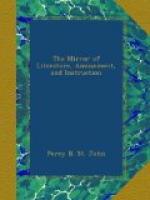Accustomed as our readers are to the quips, quirks, and quibbles, of the Gatherer, we doubt whether the following loose reflections will not be received as egotistical, or out of place. But we are induced to the hazard by the recent appearance of “The Tale of a Modern Genius,” (stated to be by Mr. Pennie,) and an interesting paper in the last London Magazine, entitled “Memoirs of a Young Peasant:” in which productions the fates and fortunes of genius are set forth with very powerful claims to the sympathy of readers. Indeed, we recommend their perusal to many of our “neglected” correspondents, in the hope of their becoming more reconciled to the justice with which their contributions are rejected. In the comparison, their works will be as “the labours of idleness,” listlessly penned under first impressions, or, at best, with the fond anticipation of appearing in print. Vexatious as the disappointment may appear, what is it compared with the bare fate of genius, stripped of the bare means of sustenance by the unsuccessful result of a literary engagement, or the non-completion of a purchase, on which probably depended the very day’s existence. The subject is trite and hacknied; but all that has been written about the illusions and misgivings of genius will not alter its complexion. It is true that such details have raised a spirit of sympathetic forbearance towards the distresses of men of letters, except in the breasts of the most barbarous and vulgar. But their sufferings are doubly acute, and their perceptions doubly tender. In their intercourse with mankind, they become flattered by associates, and it not unfrequently happens that men who are the most ready to quote such ascendancy or superiority in society, are the first to break the charm they have created, by some act of extreme rigour. Such conduct is cruel and unchristian.
Again, the sufferings of men of genius are increased by their own reflection on them, and in addition to real woes they thus inflict on themselves thousands of imaginary ones. A loss in trade may be repaired by the profits of the succeeding day, and all be set right, where gain is the sole idol; but when fame is mixed up in the pursuit, there is a suffering beyond the hour, the day, or the year—mixed up in the defeat. Hope is crushed; and after her flittering shade spring up misanthropy and despair.
Light and fickle as is the public taste for literature, we are disposed to think that, (barring the influence of great names) the chances of success are as frequent in this as in any other field of human ingenuity; and we can assure the public that our repose has not always been on a bed of roses. But it seems to be with certain literary candidates as with nations: there is a certain point of fame which men seem content to reach, after which, in return for the darling caresses of the world, they kick at their patrons; and if the maxim work true, that the fame of authors suffers by our known contact and conversation with them, Sir Walter Scott’s recent avowal is a dangerous step, unless he was tired of his fame. Of course, we have not yet arrived at the above point, so that our readers need not fear our ingratitude; and we are willing to abide by the condition, that when we forget our patrons, may they forget us.




